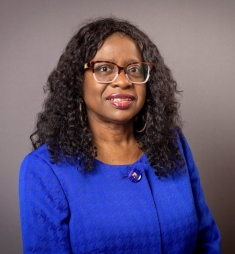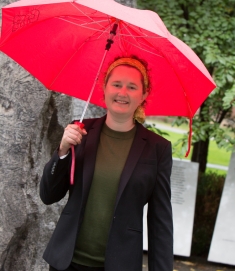
IIDEA Committee Members
Meet the 2025-2027 IIDEA Committee
Click on each person's name below to learn more about their research and interests relating to IIDEA.
-

I’m excited to once again serve as staff representative on the IIDEA Committee because I care deeply about creating a school community where everyone feels respected, supported, and able to thrive in their spaces. As staff, we experience the School’s culture in unique ways, and I believe it’s important to bring our perspectives to the table as we work to build a truly inclusive culture.
For me, being part of this committee is an opportunity to listen, learn, and help amplify the voices of my colleagues. I want to contribute to efforts that make our workplace more vibrant and welcoming, and to support the School’s mission of advancing social justice in various ways. I want to build connections across staff, faculty, and students while helping to ensure that staff experiences are reflected in the School’s DEI goals.
-

I’m excited to once again serve as staff representative on the IIDEA Committee because I care deeply about creating a school community where everyone feels respected, supported, and able to thrive in their spaces. As staff, we experience the School’s culture in unique ways, and I believe it’s important to bring our perspectives to the table as we work to build a truly inclusive culture.
For me, being part of this committee is an opportunity to listen, learn, and help amplify the voices of my colleagues. I want to contribute to efforts that make our workplace more vibrant and welcoming, and to support the School’s mission of advancing social justice in various ways. I want to build connections across staff, faculty, and students while helping to ensure that staff experiences are reflected in the School’s DEI goals.
-

Antoinette Y. Farmer (Ph. D., University of Pittsburgh, 1991) focuses on research that examines the social and interpersonal factors that affect parenting as well as how parenting practices influence adolescent high risk behaviors, such as delinquency and substance use. This research agenda has been greatly influenced by the work of Jay Belsky, and she has also modified his ecological model as reflected in her research examining the buffering effect of social support on the relationship between parenting stress and parenting behavior. Her work in the area of parenting has led her to develop and test models to determine what variables may mediate the relationship between parenting and adolescent outcomes. She is also beginning to examine the effects of fathers' parenting practices on adolescents high risk behaviors. Her work has also examined the effects of religion/spirituality on adolescent high risk behaviors. In order to carry out her research agenda, she conducts quantitative data analysis using large national data sets. Her research has been published in Social Work, Journal of Social Service Research, and Children and Youth Services Review. She co-edited a special issue of the Journal of Social Service Research, which was devoted to informing researchers of the methodological issues confronting them when conducting research with minority and oppressed populations. She has also written several chapters on this issue as well, with the most recent appearing in the Handbook of Social Work Research Methods (2nd Edition). She has served as a consulting editor for Social Work in Education and on the editorial board for Children in Schools. Dr. Farmer has also presented at numerous national and international conferences.
-

Kristen Gilmore Powell, PhD, LSW, (she/her/hers) is an associate research professor at the Rutgers University School of Social Work, Associate Director of the Center for Prevention Science, and Director of the Northeast and Caribbean Prevention Technology Transfer Center.
My research centers on strengthening the capacity and empowerment of community-based organizations and prevention workforces to drive systemic change and address social challenges through evidence-based prevention strategies. Grounded in prevention science, evaluation methods, and team science, my work bridges academic research with real-world application. I collaborate across state, regional (including Northeastern states and the U.S. Caribbean), and national levels to advance workforce development and promote effective prevention practices. A key focus of my efforts is identifying and implementing individual and environmental strategies to reduce the harmful consequences of substance misuse, particularly in communities with high levels of need.
I’m honored to serve a second term on the IIDEA Committee and look forward to collaborating with Associate Dean Farmer and fellow committee members. I remain deeply committed to identifying actionable strategies that foster safe, equitable, and inclusive environments—across our workplace, classrooms, research initiatives, and the communities we serve. I’m grateful for the opportunity to continue advancing the committee’s mission and supporting the school’s strategic goals around Inclusion, Intersectionality, Diversity, Equity, and Advancement.
-

It is a privilege and pleasure to serve on the IIDEA committee. Much of my own work has focused on age inclusion. I advance research, teaching, and engagement to promote more inclusive social structures for people as they age in all of our diversity and in the context of multi-systemic inequities. I look forward to working as a committee to continue to advance IIDEA as a focal point of “doing the work” not just at, but through, the Rutgers School of Social Work.
To learn more about Dr. Greenfield: Emily A. Greenfield | School of Social Work | https://www.linkedin.com/in/emilyagreenfield
To learn more about the Rutgers School of Social Work Hub for Aging Collaboration: Hub for Aging Collaboration | School of Social Work | https://www.linkedin.com/company/agingcollab
-

Over the past several years, I have presented at conferences to explore and address barriers that impact students and communities, guided by Barbara Love’s Liberatory Consciousness framework. I am deeply committed to advancing equity, inclusion, and systemic change, which I actively integrate into my teaching and into practicum education. I see the IIDEA Committee as a vital space to collaborate with others in advancing equity and inclusion within our school and the communities we serve.
-

When I first stepped into a Rutgers classroom as an Associate Teaching Professor, I was thinking beyond the course syllabi and lectures. I was thinking about belonging. Who feels seen here? Who feels safe? Who doesn’t, and why? These questions have shaped every part of my work, both within and beyond the university.
That is why I am honored and deeply grateful to Dean George Liebowitz for appointing me to the Rutgers inclusion, intersectionality, diversity, equity, and advancement committee (IIDEA). The call to foster a campus where every student, staff member, and faculty member feels a genuine sense of inclusion and connection is not just professional—it’s personal. It aligns with my broader mission: to bridge clinical insight, community engagement, and inclusive education in ways that promote healing and resilience.
As President of the NASW New Jersey chapter and a scholar-practitioner, my focus has long been on trauma-informed, community-centered civic engagement, especially where environmental and social crises intersect with mental health. At Rutgers, I help students develop civic science communication skills rooted in collaboration and empowerment, especially for historically marginalized communities.
My dual lens—as an educator and organizational leader—allows me to bring valuable perspectives to the IIDEA committee. Through research on AI-driven expressive arts for trauma recovery and advocacy for sustainable, equity-centered interventions, I aim to support interdisciplinary collaboration and elevate voices that too often go unheard.
Serving on this committee is an opportunity to build bridges between disciplines, communities, and people so that our shared future at Rutgers reflects the inclusive, flourishing campus we all deserve.
-

Angie is on the IIDEA committee to contribute to policy and procedural changes that foster anti-oppressive social work education and practice at RUSSW.
-

I am honored to serve on the IIDEA Committee and to support its mission of advancing equity, inclusion, diversity, and accessibility across Rutgers School of Social Work. This work is especially critical in creating spaces where all members of our community feel respected, represented, and empowered. I look forward to collaborating with colleagues to strengthen initiatives that foster belonging, challenge systemic inequities, and uphold the School’s deep commitment to social justice. Together, we can continue building a more inclusive and affirming environment for students, faculty, and staff alike.
Past IIDEA Committee Members
2023-2025 Committee Members
- Margarita Baldeo | DSW Student Representative
- Thomas Benjamin | Research/Academic/Educational Programs Representative
- Qiana L. Brown | Faculty Representative
- Carmen R. Castro | Staff Representative
- Antoinette Farmer | Committee Chair
- Kristen Gilmore | Faculty Representative
- Tawanda Hubbard | Faculty Representative
- Kristen Indriso | MSW Nontraditional Program Student Representative
- Rupa Khetarpal | Faculty Representative
- Veerja Mehta | MSW Traditional Program Student Representative
- Lucy Nonas-Barnes | Ph.D. Student Representative
- Nina Santiago | BASW Student Representative
- Rebecca Swann-Jackson | IFF Staff Representative
- Nivedhitha Thiruvenkadam | Ph.D. Student Representative
- Karen Zurlo | Faculty Representative
2023-2024 Committee Members
- Zan Haggerty, Academic Year 2022-2024 | DSW Student Representative
- Michael Joo, Fall 2023 | Faculty Representative
- Lenna Nepomnyaschy, Fall 2023 | Faculty Representative
- Gabriel Robles, Academic Year 2023-2024 | Faculty Representative
2022-2023 Committee Members
- Valentina Gil | MSW Traditional Program Student Representative
- Julia Katz | BASW Student Representative
- Alia Zarwi | MSW Non-Traditional Program Student Representative
2021-2022 Committee Members
- Monica Grace Sanagustin | MSW Traditional Program Student Representative
- Vimmi Surti | MSW Non-Traditional Program Student Representative
- Angela Jones | BASW Student Representative
- Tangela Sawyerr | DSW Student Representative
- Iris Cardenas | PhD Student Representative
2020-2021 Committee Members
- Brenda Collados | MSW Student Representative
- Amos Koffa | BASW Student Representative
- Kira O'Brien | DSW Student Representative
- Sheila Borges Rajguru, PhD | Research/Academic/Educational Programs Representative
2020-2023 Committee Members
- Edward Alessi | Faculty Representative
- V. DuWayne Battle | Faculty Representative
- Elsa Candelario | Faculty Representative
- Jacquelynn Duron | Faculty Representative
- Christine Morales | Faculty Representative
- Cathy Thompson-Fix | IFF Staff Representative
- Emmy Tiderington | Faculty Representative
